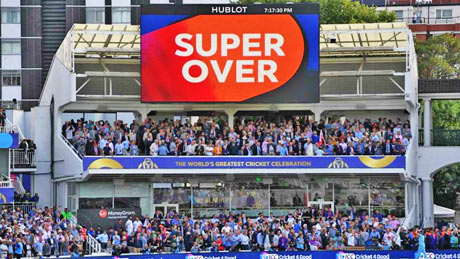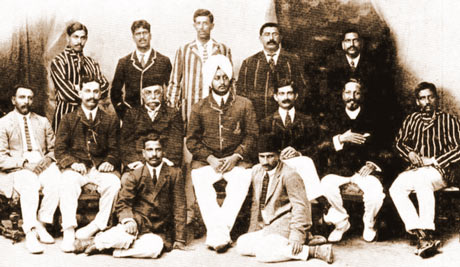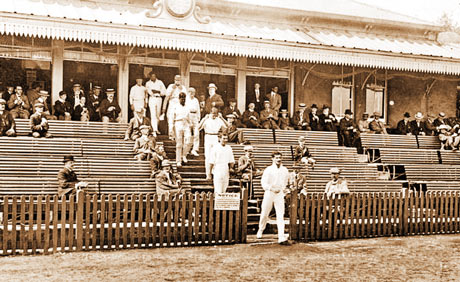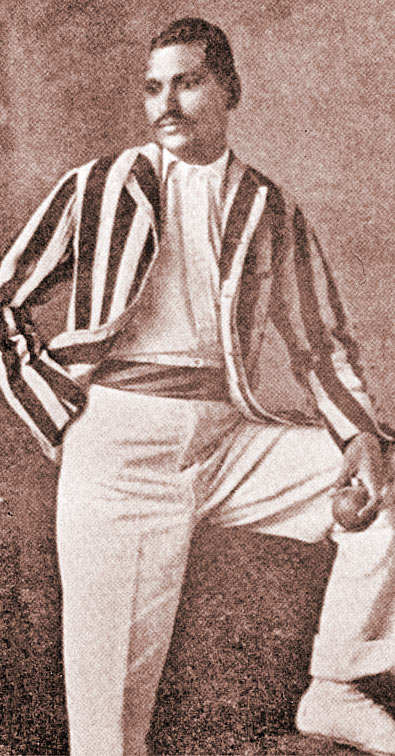July 17, 2019 issue
Cricket

By Nagraj Gollapudi
News editor, ESPNcricinfo
Gary Stead, New Zealand's head coach, has suggested that the possibility of sharing the World Cup was something that "should be considered" after his side were denied in a heartbreaking finish at Lord's on Sunday. The teams could not be separated after 100 overs and also tied the Super Over, but England lifted the trophy after winning on boundary countback.
Having slept on the result, Kane Williamson described the manner in which the final was decided "a real shame". New Zealand had further cause to be disappointed, after it transpired that England should almost certainly have only been awarded five overthrows, rather than six in the final over of regulation time.
"Make sense of it? I think that'll take quite a bit of time actually," Williamson said. "Such a fine line. May be the worst part is there is so much you can't control in those situations and it still sort of eventuates the way it did. All in all it was a real shame that the tournament was decided in the way it was after two teams went at it. And two good teams were playing a cricket game, but it was still a tie.
Stead and Craig McMillan, New Zealand's batting coach, agreed that allowing England and the Blackcaps to share the World Cup would have been an ideal finish. Asked during a media interaction at the team hotel whether he would have preferred New Zealand being declared joint winners, Stead was open to the suggestion.
"Perhaps when you play over a seven-week period and can't be separated on the final day, that is something should be considered as well," Stead said. "But again that's one consideration over a whole lot of things that went on over the World Cup. Everything will be reviewed, and I think that it's a good time to do it now. But probably just let the dust settle for a while."
However, McMillan, whose contract finished with the World Cup, was more straightforward, saying sharing the trophy would have been the "right thing" in contrast to the tie-breaker in the form of the Super Over, a rule adopted last year by the ICC. "It is not going to change yesterday's result. But what is probably fair to say at the end of seven weeks in a big tournament like this, when you have two teams can't be separated after a 50-over match and then a Super Over and neither team did actually lose in many ways in terms of runs scored.
"Then perhaps sharing the trophy would be the right thing to do. Wasn't to be yesterday, which we all are disappointed with. But it is sport and those were the rules."
There were a number of turning points during England's chase, with several occurring one after the other in the final half hour. The biggest was when Martin Guptill's return throw from deep midwicket hit the back of Ben Stokes' bat and ricocheted for four overthrows, thus reducing England's target to a mere three runs from two balls. The on-field umpires Kumar Dharmasena and Marais Erasmus consulted the TV umpire before declaring the six runs.
Subsequently, as reported by ESPNcricinfo, it seems England were actually wrongly awarded an extra run. Simon Taufel, a former ICC Elite Panel umpire, said the match officials had "goofed up". New Zealand remained unaware of exact wording of the rule even the day after.
Williamson said he trusted the match officials' word and refused to complain about how things turned out. "I actually wasn't aware of the finer rule at the point in time," Williamson said. "Obviously you are trusting the umpires in what they do. You throw that into the mix of few hundred other things that may have been different that we wouldn't be just talking about one thing.
"Two great campaigns. From our side of things, we are really proud of the way the guys went about their business. And am sure the English were as well, they had a great campaign. It sort of showed – we went toe-to-toe and it was the fine print that decided it."
Stead, too, tried hard to be realistic. He felt New Zealand could do nothing but accept their fate. He felt Super Over probably was currently the only way to pick a winner until the ICC devised a better solution. "That is one," he said of the idea of having several Super Overs, again and again, until there's a winner. "I guess a valid way as well. The hard thing I find is a 50-over competition being decided on a one-over bout, just doesn't seem quite right, but then I don't write the rules. That's the way it goes."
Both Stead and McMillan were confident the ICC would review whether the Super Over was indeed the best way to deal with the scenario like a tie in a World Cup final. But for New Zealand, as McMillan said, nothing would change now.
"Small margin this, isn't it? I don't know that rule to be perfectly honest. I have played a lot of games of cricket, watched a lot of cricket – overthrows have just been added to what has been run as opposed to the point of the throw coming in. So, again, it will be something that will be something debated, discussed, but again it doesn't change the result."
of redemption
Ben Stokes has been saying sorry a lot lately.
His latest apology was to the people of New Zealand for one of the most outrageous sporting flukes that contributed to England winning the Cricket World Cup at the expense of the country of his birth.
Stokes had already broken New Zealand hearts by steering England out of early strife in the final at Lord's, giving his adopted nation a fighting chance of victory heading into the last over.
His mighty six over midwicket left England needing nine runs to win with three balls left.
Then it happened. Smashing the next ball deep into the leg side, he set off to run two and ensure he kept the strike. As he sprinted back to the striker's end, he dived and stretched his bat out in a desperate bid to reach the crease. The ball, thrown in by Martin Guptill, struck Stokes' outstretched bat and deflected 90 degrees, rolling all the way to the boundary in front of the famous pavilion at Lord's.
It was another six for Stokes two ran, as well as four for the boundary. He held up both hands in an apologetic gesture to New Zealand's players.
“I said to Kane Williamson, 'I'll be apologising for that for the rest of my life',” said Stokes, who was born in Christchurch and moved to England when he was 12.
Yet Stokes, who finished regulation play unbeaten on 84, wasn't finished there.
He came back out with England wicketkeeper Jos Buttler for the World Cup's first ever Super Over, required because the match was tied after the regulation 50 overs per side, and struck eight runs in the first four balls. One of them was a boundary.
With the Super Over also tied, England ultimately won using the tiebreaker of boundaries scored. Stokes hit eight of England's total of 26 and was named man of the match.
“He's almost superhuman,” England captain Eoin Morgan said.
It felt like a day of redemption at Lord's for Stokes, often described as the bad boy of English cricket because of a rap sheet that recently included a court case for his involvement in a street brawl in Bristol after a one-day international against the West Indies in September 2017.
Stokes knocked unconscious a man who, according to the England allrounder, was verbally abusing two gay men outside a club.
He was found not guilty by a court of affray in August last year. He was, however, handed an eight-match suspension by the England and Wales Cricket Board and fined 30,000 pounds ($38,000).
“I have already apologised to my teammates, coaches and support staff for the consequences of my actions in Bristol,” Stokes said in a statement issued in December.
“I regret the incident ever happened and I apologize to England supporters and to the public for bringing the game in to disrepute.”
Stokes spent a night in a prison cell in 2011 after being arrested for obstructing a police officer. He apologised but was still sent home for going out drinking with a teammate until the early hours during an England Lions tour of Australia in 2013.
He also missed the Twenty20 World Cup in 2014 after injuring his hand punching a dressing-room locker following a golden duck against the West Indies.
Indeed, Stokes hasn't had much luck at the T20 worlds. In 2016, he was hit for four straight sixes by Carlos Brathwaite in the last over of the final against West Indies as England slumped to an improbable loss at Eden Gardens in Kolkata.
Stokes was close to tears.
“I thought, 'I've just lost the World Cup',” he said. “I couldn't believe it.”
But all is forgiven after what he produced at Lord's on Sunday.
“It was almost written in the stars for Ben Stokes,” England batsman Joe Root said. “He's had such a tough time, I'm so proud of him and pleased for him and his family.”
Stokes said that experience from 2016 meant there was no way he was going to put his hand up to bowl in the Super Over.
“But there was no chance I wasn't going to bat,” he said.
“It's fantastic,” he added. “Without the lads in the ODI team and the test team and the support from my family [...] that's all gone now.”
Indian cricket team

By Prashant Kidambi (Historian)
(Courtesy: BBC News)
Cricket, it has famously been said, is an Indian game accidentally invented by the English.
By a curious historical irony, a sport that was the exclusive preserve of colonial elite is now the national passion of the formerly colonised. What is equally extraordinary is that India has become world cricket's sole superpower.
It is a status much savoured by contemporary Indians, for whom their cricket team is the nation. They regard "team India" as a symbol of national unity, and its players a reflection of the country's diversity.
Cricket Country
"In this last decade," former cricketer Rahul Dravid noted in 2011, "the Indian team represents, more than ever before, the country we come from – of people from vastly different cultures, who speak different languages, follow different religions, belong to different classes."
But the link between cricket and the nation was neither natural nor inevitable.
It took 12 years and three aborted attempts before the first composite Indian team took to the cricket field in the summer of 1911. And contrary to popular perception – fostered by the hugely successful Hindi film Lagaan – this "national team" was constituted by – and not against – empire.
A diverse coalition of Indian businessmen, princely aristocrats and publicists, working in tandem with British governors, civil servants, journalists, soldiers, and professional coaches made possible the idea of India on the cricket pitch.
Because of this alliance between colonial and local elites, India was represented by a cricket team in imperial Britain more than a hundred summers before Virat Kohli and his men embarked on their campaign for the 2019 ICC World Cup.

The Magical Ranji
The project to construct an "Indian" cricket team had a long and tortuous history. The idea was first floated in 1898, following the stunning rise of Kumar Shri Ranjitsinhji or Ranji, an Indian prince who bewitched Britain and the wider imperial world with his sublime batting.
Indian cricket promoters sought to capitalise on Ranji's celebrity in putting together a team. But Ranji, who used his cricketing prestige to become the ruler of Nawanagar, was wary of a project that might raise questions about his nationality and, in particular, his right to represent England on the cricket field. There were some in the English establishment – notably, Lord Harris, the ex-Governor of what was then Bombay – who had never reconciled themselves to Ranji's astonishing cricketing success and continued to regard him as a mere "bird of passage".
Four years later, a different imperative was at work. Now, Europeans in colonial India, who sought to attract teams from home, collaborated with powerful local elites to create an Indian team that would showcase the country's potential as a cricketing destination.
But the venture failed because of fierce divisions between Hindus, Parsis and Muslims over the question of their representation in the proposed team.
A subsequent attempt in 1906 met with the same fate as previous failed ventures.
The years between 1907 and 1909 saw a wave of "revolutionary" violence by young Indians who targeted British officials and their local collaborators. And there were strident calls in Britain to prevent the free movement of Indians into the country.
Curious Cast
Dismayed by the negative publicity generated by these acts, leading businessmen and public figures, along with prominent Indian princes, sought to revive the project of sending an Indian cricket team to London. This was the historical context within which the first "all-India" cricket team took shape.
The men who were chosen to represent India on the imperial stage made for an improbable cast of characters.
The captain of the team was 19-year old Bhupinder Singh of Patiala, the pleasure-seeking, newly enthroned maharaja of the most powerful Sikh state in India.
The rest of the team was selected on the basis of religion: there were six Parsis, five Hindus and three Muslims in the side.
But the most remarkable feature of the first Indian cricket team was the presence of two Dalits from what was then Bombay – the Palwankar brothers, Baloo and Shivram – who overcame the resistance of upper-caste Hindus to become top cricketers of their time.
The composition of this team shows how in the early 20th Century, cricket took on a range of cultural and political meanings within colonial India.
For the Parsis, the cricket field acquired new significance at a time of deepening anxieties about the community's supposed deterioration. As Hindus and Muslims became more competitive on the pitch and elsewhere, Parsis began to fret about their own decline.
Among northern India's Muslims too, cricket came to embody a new relationship with the political order established by British rule in the subcontinent.
Notably, the game was an integral feature of one of the most important educational initiatives in colonial India: to forge a new Muslim political identity. Of the four Muslim players named in the first Indian team, three came from Aligarh, whose most well-known institution – the Muhammadan Anglo-Oriental College – had been established by the social reformer Sir Sayyid Ahmad Khan to promote western learning within his community.
And finally, cricket also became a prism through which Hindu society was forced to reassess the insidious effects of the caste system.
At the heart of these debates was the stirring example of an extraordinary Dalit family, whose cricketing ability and achievements questioned the pernicious system of inequity and exclusion practiced by upper-castes Hindus.
For the Palwankars, cricket made their struggle for dignity and justice against discrimination possible.
Baloo, in particular, became one of the most well-known public figures among his downtrodden compatriots. He was also the hero of the great BR Ambedkar, the architect of India's Constitution and a Dalit icon.
For Maharaja Bhupinder Singh, on the other hand, the imperial game was an important instrument in furthering his political interests. The embattled ruler sought to use his position as captain of the first all-India cricket team to quell growing imperial doubts about his abilities as a ruler.

Empire Loyalism
For the empire loyalists who financed and organised the venture, cricket became a means of promoting a positive image of India and assuring authorities in Britain that the country would remain a loyal part of the British Empire.
That was the principal aim of the first all-India cricket tour of Great Britain and Northern Ireland. The timing was not a coincidence: it was the year George V was formally crowned king-emperor in London and then travelled to India for the Delhi Durbar.
It is salutary to recall this long-forgotten history at a time when cricket in the subcontinent has become the vehicle of a shrill hyper-nationalism that views sport as "war minus the shooting".
(Dr Prashant Kidambi is associate professor of colonial urban history at the University of Leicester and author of Cricket Country: The Untold History of the First All India Team (Penguin Viking)